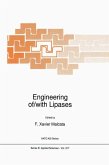Extending the range of enzymatic catalysis by using non-aqueous media has now developed into a powerful approach in biochemistry and biotechnology. One peculiar feature which distinguishes it from the conventional enzymology (carried out in aqueous buffers) is that the awareness of different parameters that control and influence the behaviour of enzymes in such environments has emerged rather slowly. Science is about being able to repeat what somebody else has done. Absence of knowledge about such well-defined parameters/fac tors has sometimes made some workers rather cautious and diffident about using this approach in their laboratories. But for this, non-aqueous enzymol ogy would be more widely practised. It is these thoughts that made me feel that the availability of some well-defined protocols for various applications invol ving enzymes in non-aqueous environments would further catalyze the growth of this area. Hence this book, in which each chapter has some protocols in a specific area. The protocols are preceded by brief background material. The early chapters, which are of general importance, concern control of water ac tivity and stabilization via immobilization. Some subsequent chapters provide the protocols for transformations involving lipids and carbohydrates, peptide synthesis, and preparation of chiral compounds. The disproportionate focus on lipases is not a coincidence; this class of enzymes has been used more often than others in non-aqueous enzymology.








